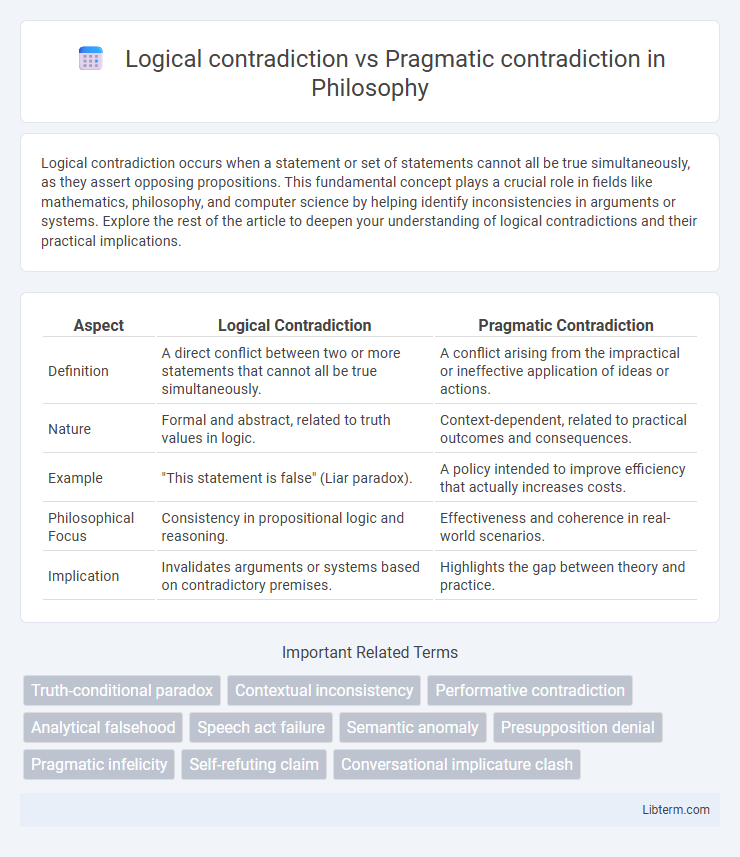Logical contradiction occurs when a statement or set of statements cannot all be true simultaneously, as they assert opposing propositions. This fundamental concept plays a crucial role in fields like mathematics, philosophy, and computer science by helping identify inconsistencies in arguments or systems. Explore the rest of the article to deepen your understanding of logical contradictions and their practical implications.
Table of Comparison
| Aspect | Logical Contradiction | Pragmatic Contradiction |
|---|---|---|
| Definition | A direct conflict between two or more statements that cannot all be true simultaneously. | A conflict arising from the impractical or ineffective application of ideas or actions. |
| Nature | Formal and abstract, related to truth values in logic. | Context-dependent, related to practical outcomes and consequences. |
| Example | "This statement is false" (Liar paradox). | A policy intended to improve efficiency that actually increases costs. |
| Philosophical Focus | Consistency in propositional logic and reasoning. | Effectiveness and coherence in real-world scenarios. |
| Implication | Invalidates arguments or systems based on contradictory premises. | Highlights the gap between theory and practice. |
Introduction to Logical vs Pragmatic Contradictions
Logical contradictions arise when two or more statements violate the fundamental laws of logic, such as asserting both a proposition and its negation simultaneously. Pragmatic contradictions occur within communication contexts where expressed intentions or actions conflict with social norms or practical outcomes, even if not logically inconsistent. Understanding the distinction between logical and pragmatic contradictions is essential for analyzing argument validity versus real-world communicative effectiveness.
Defining Logical Contradiction
Logical contradiction occurs when a statement and its negation are both asserted, making the statement inherently false in all possible interpretations, such as "It is raining and it is not raining." Pragmatic contradiction arises from conflicting practical implications or actions rather than purely formal logic, often involving context-dependent meaning. Defining logical contradiction involves identifying statements whose truth values cannot simultaneously be true, grounding its basis in formal logic systems like classical propositional calculus.
Understanding Pragmatic Contradiction
Pragmatic contradiction arises when a statement or communication conflicts with the expected context, social norms, or practical usage, rather than purely logical form. Understanding pragmatic contradiction involves recognizing how meaning depends on situational factors, speaker intentions, and audience interpretations, which differ from the absolute consistency demanded by logical contradiction. This type of contradiction highlights the nuance in human communication where apparent inconsistency may serve rhetorical, ironic, or context-driven purposes.
Key Differences Between Logical and Pragmatic Contradictions
Logical contradiction occurs when two statements cannot both be true simultaneously based on formal logic, such as "It is raining" and "It is not raining," representing mutually exclusive truth values. Pragmatic contradiction arises from practical or contextual conflicts, where statements may be logically consistent but clash due to real-world implications or speaker intentions, like saying "I am hungry" while actively eating. Key differences hinge on logical contradictions being strict violations of truth conditions within formal systems, while pragmatic contradictions depend on situational context and communicative function, impacting interpretation rather than formal truth.
Examples of Logical Contradictions
Logical contradictions occur when two or more statements cannot all be true simultaneously, such as "The square is round" or "It is raining and not raining at the same time." These contradictions violate the law of non-contradiction in classical logic, making the statements logically impossible and inherently false. Examples include "All bachelors are married" and "Some circles are squares," which demonstrate direct conflicts in definition or factual reality.
Real-World Scenarios of Pragmatic Contradictions
Pragmatic contradictions arise in real-world scenarios when statements or actions conflict with practical context or social norms, such as promising to meet but intentionally not showing up, undermining trust despite logical consistency. Unlike logical contradictions, which violate formal logic (e.g., "It is raining and not raining simultaneously"), pragmatic contradictions involve discrepancies between expressed intentions and actual behavior, often leading to misunderstandings or social friction. Examples include conflicting workplace instructions where rules contradict practical feasibility, highlighting tensions between formal directives and real-life execution.
Consequences of Logical Contradictions in Reasoning
Logical contradictions undermine the validity of an argument by rendering it impossible for all premises to be true simultaneously, leading to a breakdown in deductive reasoning processes. Such contradictions cause inferential paralysis, where no consistent conclusions can be drawn, thereby threatening the integrity of formal proofs and computational logic systems. The presence of a logical contradiction in reasoning typically demands reevaluation of premises, as unresolved contradictions can invalidate entire theoretical frameworks or algorithms.
Impact of Pragmatic Contradictions in Communication
Pragmatic contradictions in communication occur when the intended meaning conflicts with contextual or social expectations, leading to misunderstandings and decreased trust between interlocutors. Unlike logical contradictions, which violate pure formal logic, pragmatic contradictions disrupt effective message delivery by causing confusion or offense, influencing interpersonal dynamics negatively. Recognizing and addressing pragmatic contradictions is crucial for enhancing clarity, fostering mutual understanding, and improving overall communication efficiency.
Resolving Logical vs Pragmatic Contradictions
Resolving logical contradictions involves identifying inconsistencies within formal systems or propositions, ensuring coherence through rigorous proof or refutation methods. Pragmatic contradictions require addressing conflicts between intentions, beliefs, or speech acts by clarifying context, intent, and speaker meaning. Effective resolution of logical versus pragmatic contradictions depends on applying appropriate strategies such as formal logic analysis for the former and pragmatic context evaluation for the latter.
Conclusion: Significance in Critical Thinking and Discourse
Logical contradiction occurs when two statements cannot both be true simultaneously, undermining the validity of an argument, while pragmatic contradiction arises from conflicting intentions or contexts that affect communication effectiveness. Recognizing these contradictions is essential for critical thinking as it sharpens analytical skills and ensures coherent discourse by distinguishing between formal inconsistencies and pragmatic misunderstandings. This discernment enhances reasoning accuracy and fosters clearer, more productive discussions across various fields.
Logical contradiction Infographic

 libterm.com
libterm.com